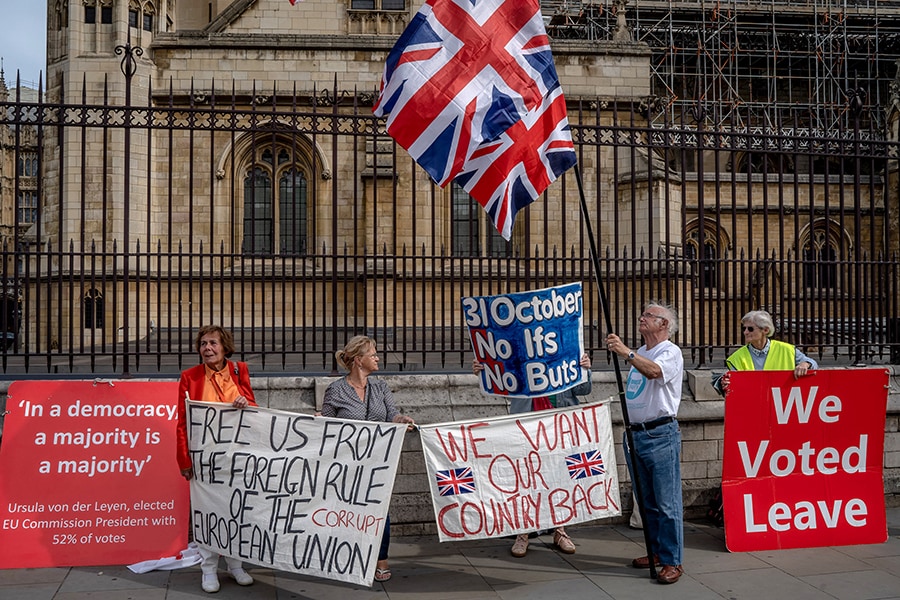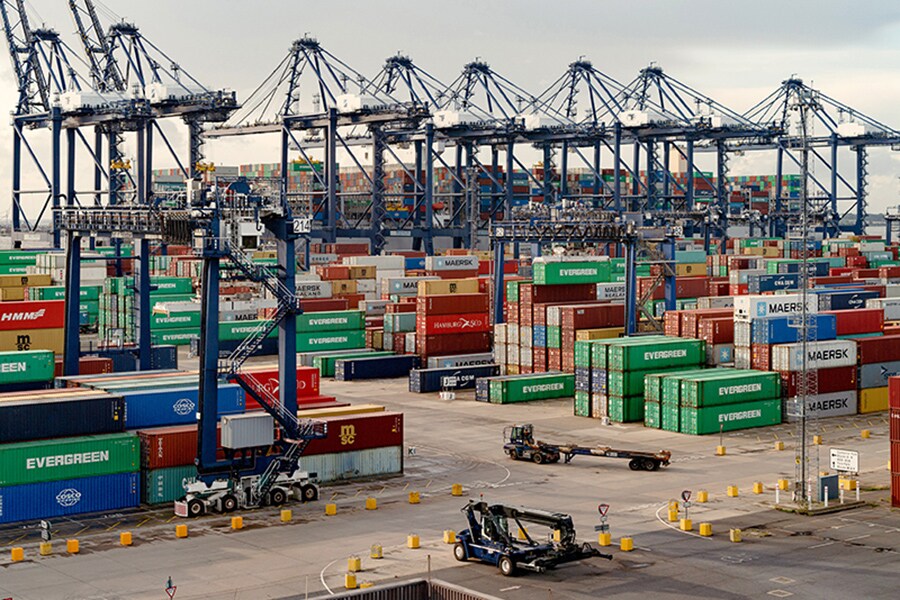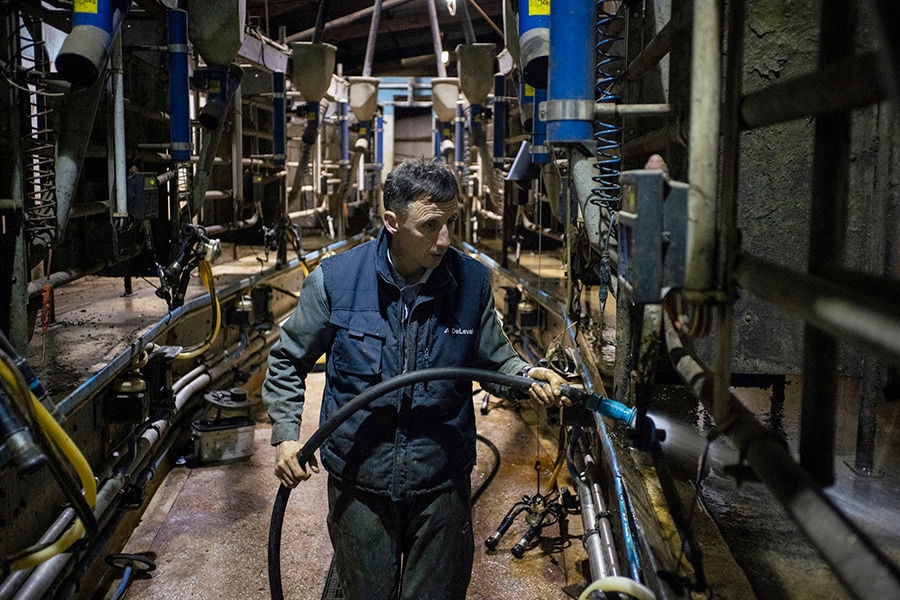Worried, scared and paralyzed: Lives caught in Brexit limbo
Brexit has brought a new level of uncertainty for many of the people who go to work each day in Britain, putting lives and livelihoods in the balance. Here are their stories


 Brexit supporters outside Parliament in London, Sept. 5, 2019. The persistent inability to decide the matter of Brexit has brought a new level of uncertainty for many of the people who go to work each day in Britain, putting lives and livelihoods in the balance. (Andrew Testa/The New York Times)[br]Britain’s halting march toward Brexit has prompted two changes in prime minister, two general elections (including one on Thursday) and a paralysis in Parliament as the debate over leaving the European Union has overwhelmed everything else.
Brexit supporters outside Parliament in London, Sept. 5, 2019. The persistent inability to decide the matter of Brexit has brought a new level of uncertainty for many of the people who go to work each day in Britain, putting lives and livelihoods in the balance. (Andrew Testa/The New York Times)[br]Britain’s halting march toward Brexit has prompted two changes in prime minister, two general elections (including one on Thursday) and a paralysis in Parliament as the debate over leaving the European Union has overwhelmed everything else.
But away from the political cut and thrust, Brexit has brought a new level of uncertainty for many of the people who go to work each day in Britain, putting lives and livelihoods in the balance. The persistent inability to decide the matter, undermined by a lack of a strong consensus on whether a divorce from Europe is even a good idea, has left few jobs untouched.
A dairy farmer cannot plan for the future because the price paid for his milk has been held hostage by Brexit a customs broker is cautiously preparing for a big expansion of business, but fearful if he makes the wrong call a tech executive in London whose payroll relies on EU workers wonders how she will fill her job vacancies and two building cleaners, whose livelihood has been rocked by outsourcing, dread the loss of job protections built on rules from the Continent.
Here are their stories.
Years ago he ‘lost everything.’ Will Brexit be better?
FELIXSTOWE, England — If and when Brexit happens, it could produce mountains of new paperwork at Britain’s ports, because every item shipped from the European Union will probably need a customs declaration.
Most people’s souls might crumple at the thought. But it’s a prospect George Baker relishes, with a bit of anxiety.
A 67-year-old customs broker, Baker has seen his fortunes sink and soar with the shipping industry.
He lost most of his business when the European Union was created in 1993 and goods were allowed to move freely within its borders. Now, Britain’s departure from the European customs union, as Prime Minister Boris Johnson has proposed, could result in a fivefold increase in declarations, a parliamentary agency estimated. A shipping container terminal in the port town of Felixstowe, England, Oct. 18, 2019. The persistent inability to decide the matter of Brexit has brought a new level of uncertainty for many of the people who go to work each day in Britain, putting lives and livelihoods in the balance. (Ben Quinton/The New York Times)[br]That could be a huge opportunity for Baker, calling for a rapid expansion of his business, or a costly disappointment if the government changes its plans.
A shipping container terminal in the port town of Felixstowe, England, Oct. 18, 2019. The persistent inability to decide the matter of Brexit has brought a new level of uncertainty for many of the people who go to work each day in Britain, putting lives and livelihoods in the balance. (Ben Quinton/The New York Times)[br]That could be a huge opportunity for Baker, calling for a rapid expansion of his business, or a costly disappointment if the government changes its plans.
Until Brexit came along, Baker was headed for retirement. He had stepped back from day-to-day operations and was looking forward to honing his patchy DIY skills at a flat he bought on Tenerife in the Canary Islands.
But, to his wife’s dismay, he has been spending more time in his home office as the family firm, George Baker Shipping, has been inundated with inquiries.
“All that infrastructure we just trashed, people are asking when we can get that back together again,” he said.
Baker has always worked in customs. At age 16, he would board Dutch ships and sit with the captain, going through the tedious paperwork. They would finish by knocking back a shot of gin before he scurried back on land with the completed forms.
By 1982, he had started his own company, determined to be his own boss.
Customs clearance was a laborious process. The paperwork for one ship could take all day.
Just as the process started to speed up with the help of fax machines and computers in the 1990s, a financial crisis hit, and then the European Union was formed. Eighty-five percent of Baker’s business vanished.
“I lost everything,” he said.
Business at George Baker Shipping has grown again as globalization has brought in bigger ships bearing cargo from places like China and Vietnam. The declaration that used to take a whole day can now be done in minutes on a computer, and the company tears through thousands a week.
But Baker views Brexit with trepidation, in part because so few details have been nailed down. If the number of customs declarations surges to the 255 million estimated by the National Audit Office, from 55 million, the volume of work will be daunting, if not outright frightening.
Baker and his family — two of his children are executives in the company — are wary of hiring people en masse until they are absolutely certain the jobs won’t be derailed by some twist in the Brexit saga.
A decade ago, after the financial crisis hit, the company had to lay off workers. “Horrible, absolutely horrible,” Baker recalled. “The huge irony is we’d be desperate for them now.”
Baker remembered a bit queasily the times his fortunes changed overnight on the back of political events: “I think probably I’ve got the collywobbles a bit about this whole thing because I’ve been through it.”
Brexit is a problem, but the uncertainty is worse
LONDON — Marta Jasinska, a Polish software developer in London, was among dozens of employees at her company whose immigration status was suddenly in flux after the Brexit referendum in 2016.
When she went to the office the morning after the vote, there wasn’t much work being done. “People were emotional,” said Jasinska, the chief technology officer at Moo, an online stationery company that specializes in business cards. Marta Jasinska, the chief technical officer at the online stationery company Moo, who moved to London from Poland and whose immigration status was suddenly in flux after the Brexit referendum in 2016, in the London borough of Croydon, Nov. 8, 2019. The persistent inability to decide the matter of Brexit has brought a new level of uncertainty for many of the people who go to work each day in Britain, putting lives and livelihoods in the balance. (Andrew Urwin/The New York Times)[br]Rather than hang around the office, she and others on her engineering team left. “We all ended up at the pub,” she said. “I made an executive decision.”
Marta Jasinska, the chief technical officer at the online stationery company Moo, who moved to London from Poland and whose immigration status was suddenly in flux after the Brexit referendum in 2016, in the London borough of Croydon, Nov. 8, 2019. The persistent inability to decide the matter of Brexit has brought a new level of uncertainty for many of the people who go to work each day in Britain, putting lives and livelihoods in the balance. (Andrew Urwin/The New York Times)[br]Rather than hang around the office, she and others on her engineering team left. “We all ended up at the pub,” she said. “I made an executive decision.”
Many others in London’s Farringdon neighborhood where Moo’s office is had the same idea. The pub became a group-therapy session for those upset by the vote — drowning their sorrow in pints of beer and guessing what would come next for the country.
In the three years since the vote, there hasn’t been much more clarity for workers like Jasinska. As the country headed for another election that may help determine its exit from the European Union, she was forced to apply for “settled status,” which she received from the government this month, allowing her to continue working in Britain.
“Brexit is a problem, but the uncertainty around what is going to happen to you is a much bigger problem,” she said.
In 2008, Jasinska moved to London from Poland to pursue software engineering work. Now, she leads a team of 110 people at Moo, including 80 engineers and developers.
Jasinska, 35, knows her predicament is hardly the most dire of those affected by Brexit. Demand for software engineers remains robust, and she knew that getting residency would be easier for her than for many others. Her company, in a stylish office spacious enough for a person to ride a bike inside from work desk to the office cafe, has helped with many legal and logistical questions.
But the experience has altered Jasinska’s view of Britain in a way that could have wider ramifications for the nation’s economy and labor force. While the country’s leaders have said technology will be a cornerstone of the post-Brexit economy, many engineers working for startups and other tech firms in London come from outside Britain, leading to fears that the pool of talent for people like Jasinska will dry up.
Jasinska has already seen a shift in her own hiring efforts since the Brexit vote. Moo canceled a recruiting initiative to lure software engineers from other EU countries to London because of the lack of interest from applicants.
“We found the pipeline had dried up,” said Kingsley Macey, who leads Moo’s recruitment efforts. “It’s a real challenge.”
Even as Jasinska tries to recruit engineers, she is no longer certain she wants to remain in London.
“This is a great tech scene, but it’s going to be very interesting to see over the next five to 10 years how it shifts,” Jasinska said. “That may change my desire to stay here.”
A new border could sour a farmer’s prospects
COLERAINE, Northern Ireland — Mervyn Gordon herded his cows into stalls for the second round of milking that day, patting some of them reassuringly.
Regardless of where people stand on Brexit, Gordon said, they’ll still want their milk. “You still have to do this here,” he said, as the milking machine chugged like a heartbeat over his soft voice. Mervyn Gordon washes milking equipment at his family"s dairy farm in Garvagh, Northern Ireland, Nov. 7, 2019. The persistent inability to decide the matter of Brexit has brought a new level of uncertainty to people"s lives and livelihoods. “With this talk about a border down the Irish Sea, what are we?” Gordon asked. “Are we U.K.? Or are we E.U. as far as trade tariffs go?” (Paulo Nunes dos Santos/The New York Times)[br]But behind his sanguine comments, Gordon, a 55-year-old dairy and chicken farmer in Northern Ireland, is worried. He is getting less money for his milk because of the uncertainty around Brexit. Gordon’s biggest market for his milk is across the Irish Sea, and he does not know if he will readily find buyers if Britain adopts the Brexit deal negotiated by Johnson. And as the general election nears, it’s still uncertain when he’ll get any answers.
Mervyn Gordon washes milking equipment at his family"s dairy farm in Garvagh, Northern Ireland, Nov. 7, 2019. The persistent inability to decide the matter of Brexit has brought a new level of uncertainty to people"s lives and livelihoods. “With this talk about a border down the Irish Sea, what are we?” Gordon asked. “Are we U.K.? Or are we E.U. as far as trade tariffs go?” (Paulo Nunes dos Santos/The New York Times)[br]But behind his sanguine comments, Gordon, a 55-year-old dairy and chicken farmer in Northern Ireland, is worried. He is getting less money for his milk because of the uncertainty around Brexit. Gordon’s biggest market for his milk is across the Irish Sea, and he does not know if he will readily find buyers if Britain adopts the Brexit deal negotiated by Johnson. And as the general election nears, it’s still uncertain when he’ll get any answers.
Johnson’s deal would keep Northern Ireland aligned with the European Union’s single market, avoiding a physical border with the Republic of Ireland. But it effectively draws a customs border down the Irish Sea, separating Northern Ireland from the rest of the United Kingdom.
“Boris’ deal has still got an awful lot of unknowns,” Gordon said, expressing a concern commonly heard in Northern Ireland. “With this talk about a border down the Irish Sea, what are we? Are we U.K.? Or are we EU as far as trade tariffs go?”
The same day, Johnson was about 45 miles away, telling Northern Ireland exporters that they would enjoy unfettered access to Britain. He told them that they would not face any extra checks or paperwork, contradicting his own Cabinet ministers who have said customs declarations would be required.
The uncertainty around the terms of departure have weighed on milk prices in Northern Ireland, which have fallen further than in the rest of Britain. Milk processors, who might face higher costs if customs declarations and physical checks are required under a new Brexit arrangement, are hesitant to pay more for Gordon’s milk. The drop in the value of the pound since the 2016 referendum has also helped push up costs for dairy farm supplies like fuel and fertilizer.
The effects are expected to be felt across Northern Ireland’s economy. Treasury documents leaked last week said 98% of exporters from Northern Ireland to Britain were small and medium-size businesses that would struggle to bear the extra costs of customs declarations and checks. The rising cost of goods coming from Britain to Northern Ireland is also likely to weigh on the economy.
At the same time, Gordon would like to build a new milking parlor. He spends about five hours a day milking his 117 cows, once at 5:30 a.m. and again at 4 p.m. A new milking parlor, costing as much as 300,000 pounds, or about $394,000, would give him more time to do other things.
But if Gordon is cut off from his biggest market in Britain, that new investment may not make sense.
Still, he feels the need to expand if he is to survive. Margins are constantly being squeezed, and the price he gets for milk has not kept up with inflation over the years. “If you stand still, you go back in dairy farming,” he said.
Migrant workers fear their rights could vanish
LONDON — Every evening, after office workers across London have logged off and headed home, people arrive to clean up the mess. Very often, these cleaners are from outside Britain.
“We do the job that they don’t do,” said Wilson Ayala, an Ecuadorean who came to Britain seven years ago. “They see us as cheap labor.”
Ayala, 57, has cleaned the prestigious Royal College of Music and office buildings in the financial district. He pointed out that cleaners like him help keep businesses and organizations running, and that they pay taxes.
Ayala has a Spanish passport and settled status with the government, which allows him to remain in Britain after Brexit. For low-wage workers who want to come after Brexit, it may be more difficult: They may be allowed in only on limited visas.
And Ayala, a labor activist, worries that the protections that he and his union have fought for could unravel without a European regulatory framework.
Building maintenance and cleaning are often outsourced. Cleaning companies compete for contracts, and workers often end up changing employers when a building’s contract changes hands. Ayala has worked for five or six companies since arriving in Britain, and working conditions change with each transfer, he said.
Through the Independent Workers Union of Great Britain, Ayala has taken a previous employer to court over discrimination and breach of regulations, and has tried to help other workers who say their employers have mistreated them.
The union has fought cases relying on regulations derived from EU law, like protections against unilaterally cutting pay or firing employees when one company takes over from another.
With Britain a part of the European Union, “the U.K. has to respect the laws that come from the EU,” said Ayala, who is now the chairman of the cleaners’ branch of the union.
The latest Brexit deal allows for significant divergence from European rules, according to documents leaked to British media. The Labour Party said the papers confirmed its “worst fears” about the potential weakening of workers rights.
“We’re worried, we’re scared, we have doubts,” Ayala said. “We don’t know what’s going to happen with our future.”
First Published: Dec 11, 2019, 13:21
Subscribe Now